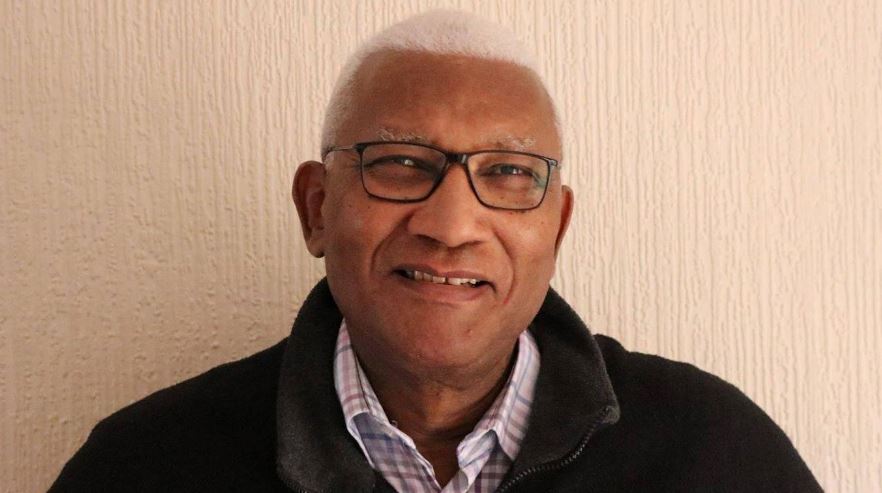Life-threatening sepsis infection prompts Colchester resident to have ‘amazing’ cataract surgery

For the first time in over 20 years, retiree – and cancer survivor – Audley Byfield is enjoying clear vision without glasses.
As a former electronics technician, Audley has always understood the importance of looking after his eyes – but it was only after a life-threatening sepsis infection that hospitalised him for three weeks did he opt to undergo surgery to treat his worsening cataracts.
77-year-old Stanway resident Audley had been wearing glasses for more than 20 years when his local optician advised he required cataract surgery. He says: “My vision wasn’t good. Before I retired 13 years ago, I worked in the electronics industry and this caused a lot of eye strain. The components are tiny and when testing the equipment I had to look from a magnifier in front of me to maybe three metres away, to see the readings. It put a lot of stress on my eyes.
“Not only that, but I was born in Jamaica, so when I was younger the bright sunshine affected my sight too.”
Audley knew he would need to get his cataracts treated, but his priorities shifted five years ago when he was diagnosed with myeloma, a blood cancer affecting plasma cells in bone marrow. In the same year, Audley’s father passed away and he also lost his wife to cancer.
A couple of years passed and Audley, now in remission, started to notice his eyesight deteriorate further – particularly when he was driving. “I was finding it more difficult to drive at nighttime,” he continues. “I could rely on memory when I knew the roads, but not on routes I didn’t know. In the end, my vision was so bad that my optician said I was going to need to have the cataract surgery soon.”
However, it wasn’t until February of this year, when he was hospitalised for a serious infection after testing positive for COVID-19 that Audley decided he could no longer put off having the cataracts treated.
“One moment, I was getting on with things, wearing my glasses, and the next I was unable to move,” he explains. “I had no strength in my legs, I couldn’t stand up. An ambulance rushed me straight to hospital with blues and twos. It turned out I had sepsis and could have died.
“I was in hospital for three weeks and while I was there, my sight was not good at all. So, I thought, this is it, it’s got to be done now. I’m going to take the advice and get the surgery.”
Audley was referred to SpaMedica and following his initial assessment at the provider’s Chelmsford hospital, he was invited to have his first eye surgery.
“I was more than amazed at the results,” he adds. “After the first surgery, I couldn’t believe the difference – lights were suddenly so bright!”
Audley has since had both eyes operated on and is now enjoying reading and watching television without having to depend on glasses for the first time in over 20 years.
“Now I’ve had both eyes treated, my confidence is restored,” he says. “My focus in both eyes is spot on and I’m seeing everything so clearly. Before, it was like looking through a net curtain. I can read everything on the television now – it’s great.
“I love taking apart old wristwatches and repairing them. Now I’ve had the surgery, I don’t even need to use a watchmaker’s eyepiece – I can see what I’m doing without it.”
Audley is urging others not to put off having cataract surgery. He adds: “It’s easy! You go in for the operation and 15-20 minutes later, you’re done. And SpaMedica is brilliant. I take my hat off to the team – the way they treat you and look after you is excellent.
“I’m over the moon with everything. Absolutely amazing!”
SpaMedica has 50 hospitals across England and supports thousands of NHS patients like Audley every week. Its expert team is dedicated to delivering the highest quality care, while helping to reduce NHS cataract surgery waiting times, with appointments available within four to eight weeks.
Hospital manager at SpaMedica Chelmsford, Cheryl Marchant, adds: “It’s fantastic to hear how Audley’s vision and quality of life has improved since his cataract surgery. Cataracts can affect confidence and independence, but for the majority of people it is a treatable condition and as Audley has explained, the procedure itself is quick and straightforward.
“I’m so pleased Audley felt at ease with our team. We make sure all our patients receive personalised care and attention, which is why over 99% say they would recommend us to their friends and family.”
Cataracts Symptoms
You may experience one or more of the following symptoms if you have cataracts:
● A decrease in vision clarity that can’t be corrected with glasses
● Colours appear faded or washed out, sometimes with a yellow haze
● Sensitivity to light, glare, and seeing halos around lights
● Frequent changes to glasses or contact lens prescriptions
It’s best to see an optician if you think you have cataracts. They will perform a thorough eye check and will be able to refer you for treatment if needed. In England patients can choose which provider they have cataract surgery with.